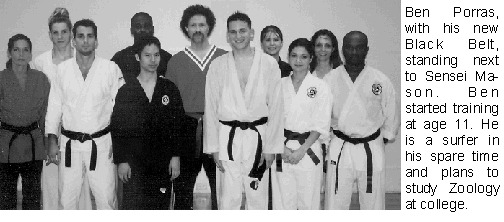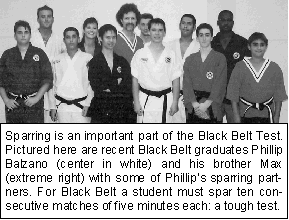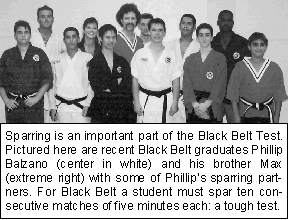Making a Commitment to Train: A Guide for Parents
Making a commitment for your child to take karate lessons when you are a parent Is a big decision which involves both the parent and the child, since both are involved in the process of training. The parent drives the child to class and the child takes the class. Along the way either can tire of the process since it can be a lengthy one, just as regular school is. Real martial arts training is just like school in many ways. The benefits will last a lifetime and the habits that are acquired can lead to success in other areas as well.
Making a decision to commit to the karate program at UKC involves understanding the main purpose of our program which is personal growth and development. This includes physical, emotional and psychological growth. Since our curriculum teaches more than just punches and kicks, we need time to instill all of the habits and values fundamental to the training.
The lasting benefits of karate for children include: learning good focus, paying attention to what is important, improved hand-eye coordination, achieving balance in class and in life, increased flexibility and stamina, understanding commands in a different language (Japanese) and remembering what technique to do, demonstrating courage, distancing and timing, (sparring class), developing memory and knowledge of sequences (forms class), working with other students in a cooperative manner (pairs class), self-defense (the basis of karate), and many more life lessons.
Martial Arts can teach children skills which will help them to be successful in this confusing and chaotic world. This training can help them make decisions that are based in good principles of conduct backed up by knowledge. Martial Arts requires commitment, consistent training and patience; but the results are well worth it for both parents and their children.
Sensei Robert H. Mason ©2002

Sempai of the Month
Emily Snyder

Our Sempai of the Month for July is Emily Snyder, our camp counselor for this year. She is seventeen years old and will be a senior at North Broward Preparatory School. She is a writer and is the editor for her school newspaper. Emily is interested in different kinds of religion, metaphysics, and likes to listen to other people’s problems. One of her favorite hobbies is reading Tarot cards.
In the future she is thinking of owning a New Age store with a room in the back for karate, yoga, Tai Chi and Reiki. She may eventually teach creative writing at the college level. According to Emily, “No matter what, I will definitely write best selling fantasy and sci fi books.” Her favorite fiction writers are Ursula K. Le Guin, and William Goldman who wrote Butch Cassidy and Princess Bride. Her friends are also writers. Some of her pet peeves are people chewing with their mouth open, kids not respecting their belts and parents giving their kids too much junk food.
Emily originally decided to take karate when she took a year off from playing soccer. Before signing up here, she scouted the area’s karate schools where she noticed that their instructors would yell at the kids unnecessarily. Emily liked this school best because she noticed that the instructors here had fun with the kids while discipline was being administered. She thought that “the approach was more balanced” at UKC.
She also likes karate because it is an individual project which takes as much time as needed in order to learn the material. Emily originally took Aikido in Philadelphia when she was eight years old. She has been able to rediscover her “inner martial artist” many years later through her training in Mudokai. Karate demands a lot of her as a way to compete with herself. In this karate school, everyone supports one another. Emily likes karate camp because she likes kids and also enjoys explaining the principles and purpose of martial arts training. She also hopes that the campers will “take something away with them which will be useful for years to come.”

The Secret to Excelling
My first priority after receiving gold belt was to get my sparring equipment and go into sparring class to "fight." Many beginning karate students have similar aggressive attitudes; but there is another type of negative attitude as well. These are the overly cautious people who put off sparring until they have "more experience". Both of these attitudes are counter-productive.
The “gung ho” beginning karate student who wants to go "fight" in sparring class has many misconceptions. First of all, sparring isn't fighting. It is more of a game of timing and distancing. Not to mention it is far removed from a "real" situation where full force is implemented with malicious intent. Secondly, the more experienced students do not appreciate the cocky attitudes of the reckless beginner. When the class is over beginners with the wrong attitude usually leave with a bruised ego and possibly other bruises. This can lead them to abandon their martial arts training.

The counterpart to the reckless beginner is the more cautious, timid student. They want to wait to spar until they have "more experience". The idea of getting more belts to gain the edge needed to succeed in sparring is misleading. Theoretical fighting is important; but the application of the theory is the ultimate goal. When this cautious student goes into sparring class after waiting until they know more theory, they usually end up being coached while they are sparring a lower– ranking student who has been sparring since gold belt. When the gloves are put on, the less experienced, higher ranking student may leave with a bruised ego, and they also may abandon their martial arts training.
These different kinds of attitude problems can lead to the same outcome. The student may quit! The Senseis don't want any students to stop training. This is why beginners are invited to sparring class at gold belt: to keep them from feeling embarrassed. There is no pressure at this beginning level because no one expects a beginner to be an expert in sparring. Also, when the proper attitude is detected by the higher ranking, more experienced students they will be much more inclined to assist the beginner instead of "teaching them a lesson". Winning in this class must be defined as simply going to the class and learning as much as possible. When I realized this I looked forward to going back to sparring class. Yes, I admit that at one point I had the wrong attitude too!
Having the proper attitude is crucial not only to being a superb karate student; but also being an outstanding member of society. Once the proper attitude is defined and implemented, everything becomes easier and more pleasant. You too will look forward to sparring class and gaining the necessary experience that might save your life one day. Learning how to fight, not just the theory of how to fight, is essential for every student’s personal growth. In closing, the next time and every time you enter the main door at the karate school, look at the banner above the window of the padded dojo. There lies the secret.
Sensei M. Bergstresser © 2002